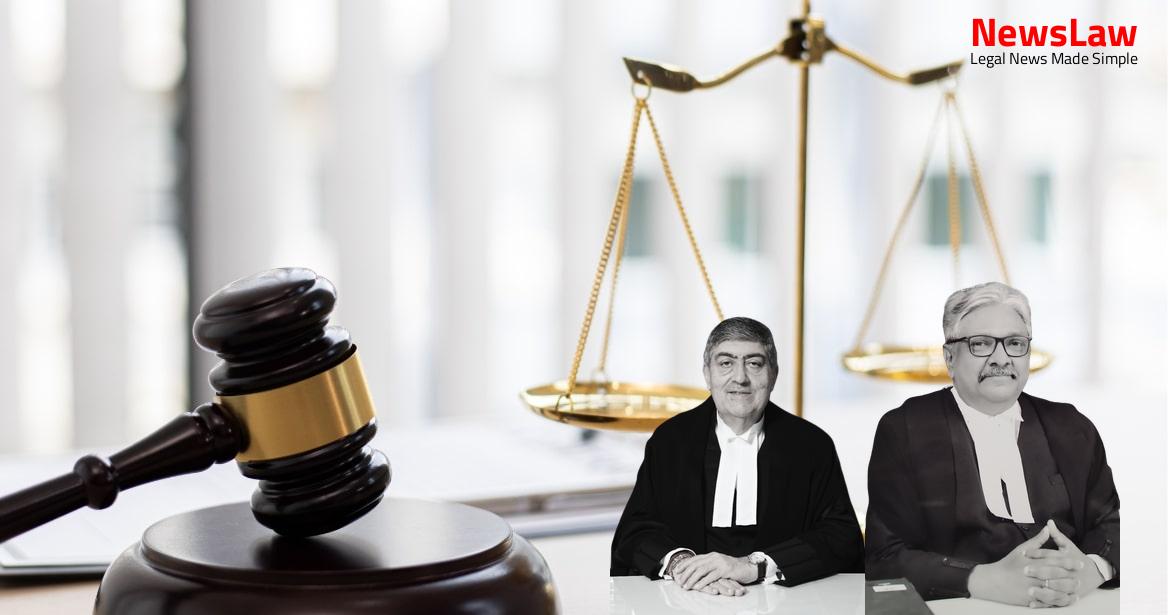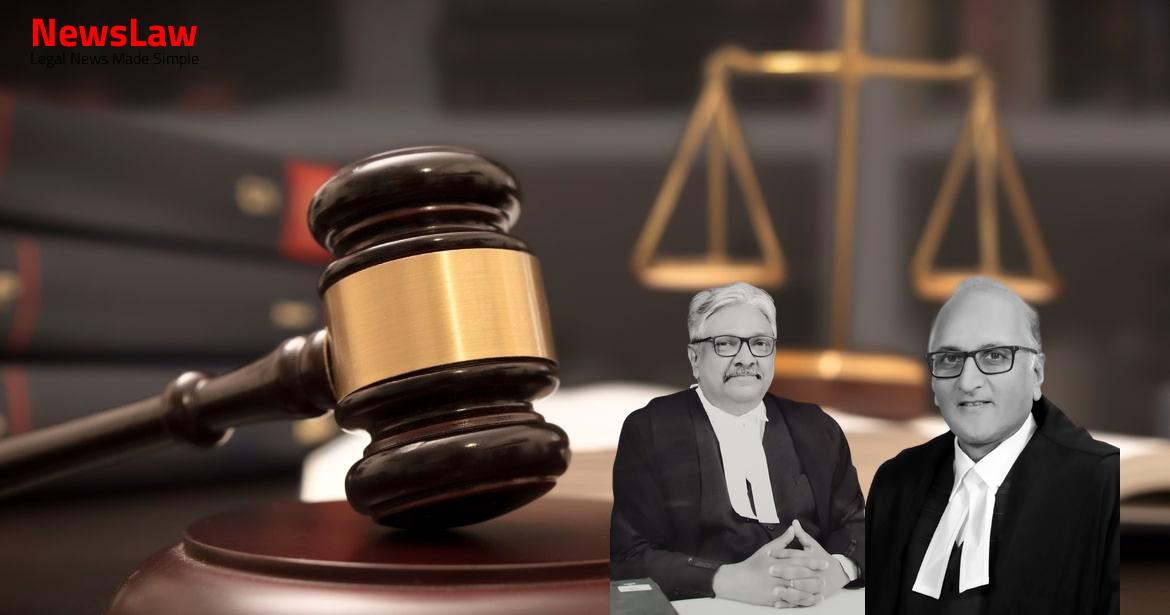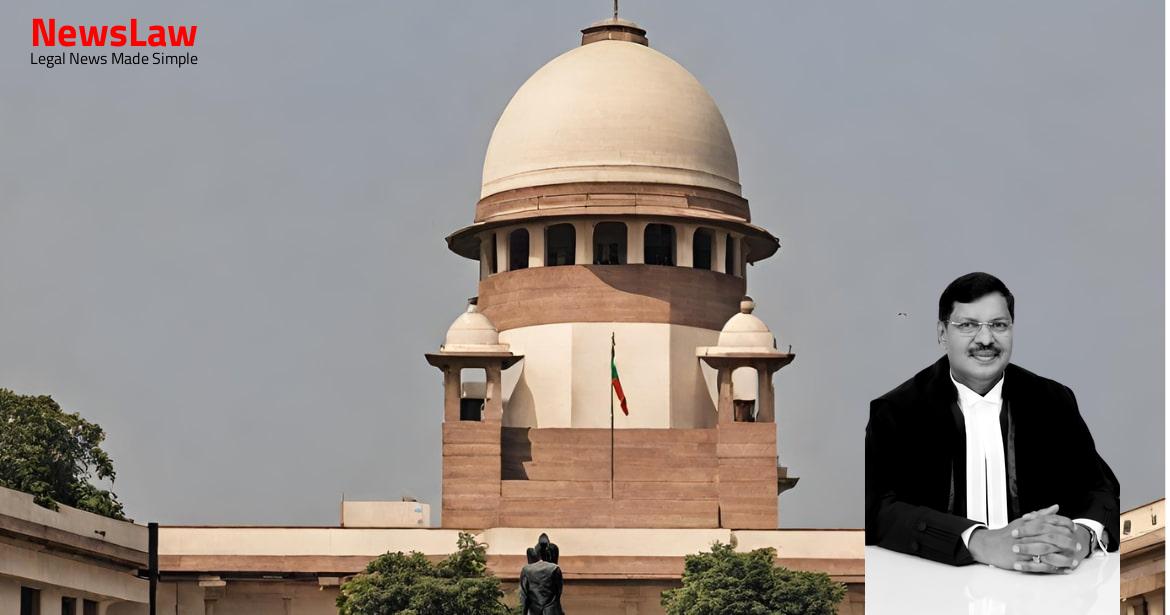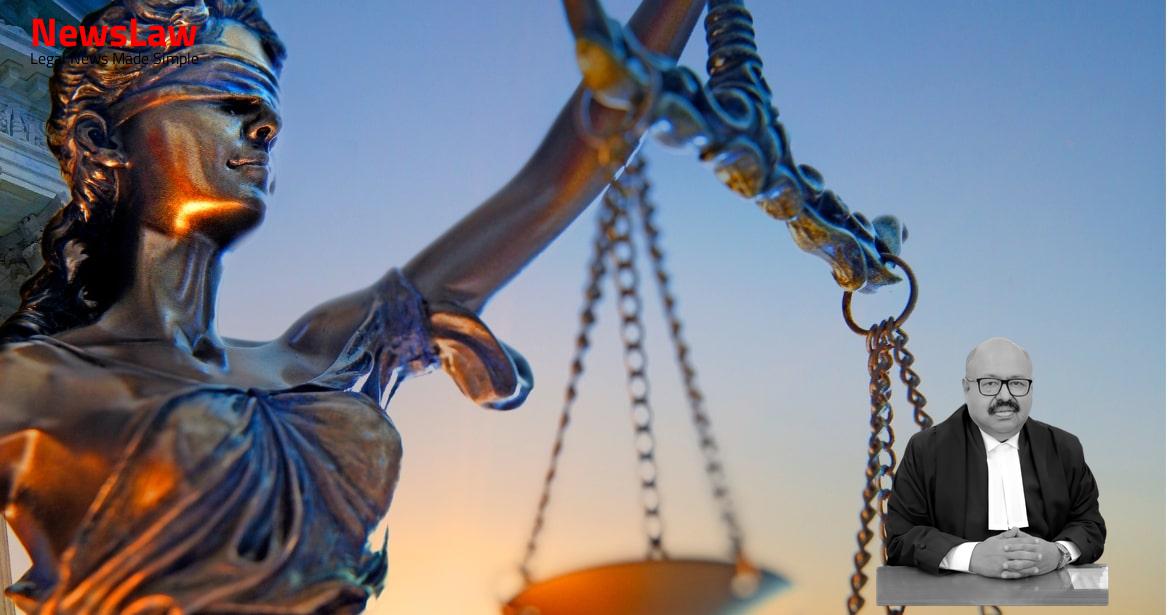In a significant legal ruling by the Supreme Court of India, a case involving allegations of fraud in VSS applications has been decided upon. The judgment sheds light on the intricacies of the case and sets a precedent for similar instances. Stay tuned to understand the implications of this ruling on VSS applications and fraud allegations.
Facts
- The High Court dismissed the Writ Application filed by the appellant.
- The appellant claimed that they never received the applicant’s letter dated 01.06.2000.
- First applicant sought payment of gratuity under the Scheme on 13.06.2000.
- A total of Rs.4,03,41,675/- was disbursed under the VSS.
- The VSS was enforced from 01.05.2000 to 31.05.2000 in Rengali Unit.
- On 08.06.2000, the application of the applicant was accepted.
- An industrial dispute was noted to be pending.
- NMRs/Contingent Khalasis requested for separation of 357 workers.
- The VSS was available until 28.02.2001 and then extended to 01.03.2001.
- The VSS involved payments like ex gratia, lumpsum differential, and other terminal benefits.
- The VSS aimed to reduce redundant manpower and optimize manpower utilization.
- NMR workers at RHEP were entitled to hydro and medical allowances.
- NMR workers signed papers for regularization which were later misused for VSS.
- Issues regarding NMR workers’ entitlements and regularization were raised.
- The Labour Court found that the VSS was forced upon the applicants without proper publicity.
- An extension of the VSS was notified for six days.
- Affidavits and decisions regarding the VSS were filed and discussed.
- 90 workers applied under Section 33A of the Industrial Disputes Act.
- Employees with five years’ service were entitled to VSS benefits.
- The High Court dismissed the Writ Application and confirmed the Award, choosing not to interfere with findings of fact.
- The applicants, NMR workers, were not attributed with knowledge of the Scheme.
- Court held there was no reason for discriminating against NMR employees.
- Certiorari jurisdiction was invoked before the High Court, finding no jurisdictional error or error apparent on the face of it.
- Labour Court acted illegally in arriving at conclusions and passing the Award.
- Labour Court overlooked evidence of VSS benefits received by workers.
- Payments to workers vouched for by procedure with two witnesses.
- Findings of fact rendered by the Labour Court were emphasized.
- Labour Court found VSS was not widely published for NMR workers’ information.
- Award was passed after appreciating oral and documentary evidence.
- Civil Appeal related to the matter was finally decided by the Supreme Court in State of Orissa v. Balaram Sahu.
- Judgment in the Civil Appeal detailed the representation of NMRs employed in projects like Rengali Hydro Electric Project.
- Clause (08) of Exhibit ‘H’ dated 24.04.2000 regarding opening SB Accounts and payment process was discussed.
Also Read: Judgment on Inconsistencies in Eyewitness Testimonies: Resham Singh v. State of India
Arguments
- The applicants initially were not cognizant of the consequences of their VSS applications.
- One of the applicants drew the attention of authorities to the purpose of the Scheme.
- Allegations of fraud and undue influence in the VSS applications were found to be without basis.
- 90 applicants submitted VSS applications as per the eligibility criteria.
- Only one applicant mentioned threat and coercion by management in their application.
- Workers moved the Conciliation Officer immediately after the event.
- An application stating withdrawal of VSS application was submitted, but the management claims it was not received.
- The Labour Court found the workers had been given the benefits under the VSS and rejected claims of fraud and coercion.
- Signatures of the applicants were taken on blank papers initially, then on VSS forms.
- The evidence presented was limited to only four workers.
Also Read: Case Summary: The Unveiling of Justice
Analysis
- In the case of Parry & Co. Ltd. v. P.C. Pal [AIR 1970 SC 1334 : (1969) 2 SCR 976], it was held that while exercising power under Article 136 of the Constitution in an appeal from the High Court’s judgment under Articles 226 and 227, the Supreme Court will not interfere with the findings of fact by the Tribunal except on valid grounds.
- The scope of a writ of certiorari was elaborately discussed in T.C. Basappa v. T. Nagappa, stating that it extends to cases where the evidence is not reasonably capable of supporting the findings, implying no tribunal could reasonably reach a particular conclusion based on the evidence.
- In cases where a Tribunal has jurisdiction to decide a question and comes to a finding of fact, Article 226 does not allow the questioning of this finding unless it can be shown to be entirely unsupported by evidence, as established in various cases like State of Andhra Pradesh v. S. Sree Ram Rao [AIR 1963 S.C. 1723].
- Certain grounds for High Court interference in writ petitions have been established over time and a writ of certiorari is generally granted when a court acts without or in excess of its jurisdiction, or contravenes principles of natural justice.
- A writ of certiorari acts in a supervisory, not appellate jurisdiction, correcting errors of jurisdiction committed by inferior courts or tribunals such as passing orders without jurisdiction, in excess of it, or due to failure to exercise jurisdiction. It can also be issued when a court or tribunal acts illegally or violates natural justice principles.
- Certiorari is available in cases where a tribunal, though competent to enter upon an enquiry, acts in flagrant disregard of procedural rules or violates principles of natural justice where no specific procedure is prescribed. However, the writ court must provide reasons for reconsidering a finding of fact and will not intervene in factual disputes unless there is a defect in the lower court’s order.
- The application filed by the employee amounted to an offer and a contract emerged only if the application was accepted by the bank.
- The concept of fraud, undue influence and misrepresentation as defined in the Contract Act would be apposite in the context of the Scheme giving rise to an enforceable contract.
- The witnesses for the appellants stated that the VSS was not published in any local newspaper.
- The High Court’s direction for regularization had not become final by the time the VSS was introduced.
- The allegations of fraud, coercion, and threat were not adequately supported by evidence.
- The signatures of the applicants were taken on VSS forms without proper notification or clarity of consequences.
- Fraud is defined under Section 17 of the Contract Act to include various acts committed with intent to deceive another party to a contract.
- Mere silence as to facts likely to affect willingness to enter a contract is not fraud unless there is a duty to disclose or the silence is equivalent to speech.
- Section 33(1) of the Act prohibits an employer from altering conditions of service to the prejudice of workmen during an industrial dispute proceeding.
- Section 33A of the Act provides for adjudication on whether conditions of service were changed during a proceeding.
- Misrepresentation is separately defined in Section 18 of the Contract Act, and consent caused by coercion, fraud or misrepresentation renders an agreement voidable.
- Exception in Section 19 states that consent caused by misrepresentation or fraudulent silence does not void a contract if the party could have discovered the truth with ordinary diligence.
- Various procedural powers and rights of parties involved in industrial disputes are outlined in the Act.
- Fraud, misrepresentation, and undue influence must be pleaded with particulars in a civil suit as per the CPC.
- Section 16 of the Contract Act defines ‘undue influence’ and sets criteria for a contract to be induced by it.
- The court may decline jurisdiction unless there is manifest injustice present.
- Appellants have shown a case of manifest injustice if the Award is not overturned.
- A Public Sector Corporation spent large sums to reduce its workforce.
- Implementing the Scheme would mean reinstatement of workers with 70% back-wages, which was deemed unwarranted.
- Workers separated under the Scheme after receiving benefits.
Also Read: Analyzing Legal Reasoning in a Poisoning Death Case
Decision
- Members of the petitioner-union who have been transferred to different divisions could not be made available to the court.
- No order as to costs.
- Opposite parties to determine which members of the petitioner-union have completed five years of continuous service by today.
- Appellants to return the entire amount deposited by 28 applicants with interest at 8% per annum from date of deposit till date of payment.
- 28 applicants deposited the amount received from the appellants while the Writ Petition was pending in the High Court.
- The deposited amount to be returned to the concerned workmen with interest.
- Appeal allowed, judgment of the High Court set aside.
- Labour Court’s Award set aside, application of the applicants dismissed.
- Amount to be returned with interest to the applicants within two months from receipt of judgment copy.
Case Title: GENERAL MANAGER, ELECTRICAL RENGALI HYDRO ELECTRIC PROJECT Vs. SRI GIRIDHARI SAHU
Case Number: C.A. No.-008071-008071 / 2010



